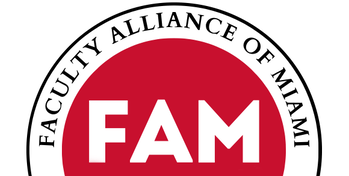A discussion of faculty morale was the agenda at today’s Faculty Assembly meeting, so it was a good time to release preliminary results of our survey about faculty concerns (you can still take the survey here). The discussion resulted in a commitment from the administration to survey faculty more formally and create an action plan based on the results. Here’s the survey summary we distributed at the meeting.
[Note: The below version of the survey summary has been edited since the Faculty Assembly meeting. When we summarized for Faculty Assembly the results of our ongoing informal survey of faculty concerns, we quoted the remark of one respondent that seemed to connect the recent deaths of several esteemed and beloved faculty to stressful conditions of employment at Miami University. This response was rhetorical and we were wrong to cite it. We regret having done so, and we apologize to the friends and families of our late colleagues and to all who were offended by the remark, which we have removed from the text below. The AAUP chapter leadership offered the results of our informal survey as we begin an overdue discussion of faculty morale at Miami; we pledge to continue our work to make Miami a better place for all. 1/27/15]
AAUP Faculty Survey Results as of January 25, 2016
Miami’s AAUP Advocacy Chapter began conducting a faculty survey in fall of 2015, both online and through one-on-one interviews. The intent is to take a snapshot of current faculty concerns and to start an ongoing conversation. This survey is not formal or scientific and is not intended to be; it is simply an opportunity for us to find out about issues important to faculty now.
Significant concerns shared by many of the nearly 200 respondents so far emerged from the survey:
Faculty health and welfare
• Health benefits
There is significant concern about the increasing transfer of cost of health care to faculty and staff. Concerns were expressed about reduced benefits, unexpected copays, doctors suddenly being out-of-network, much more. Quite a number of faculty mentioned dissatisfaction with our family leave policy.
• Faculty of color suffer disproportionately
Women and people of color do a disproportionate amount of service, while white men are routinely still the majority of hires. How can students of color & faculty of color thrive at Miami? what do they gain in return for their contributions to the institution?
• Health
Much concern was expressed about stress-related mental and physical health problems.
• Increased demands on faculty time
Perception that too many new demands are detracting from faculty’s essential roles as teachers and scholars, “all the while being billed as ‘efficiencies.’”
• Contingency
—For contingent faculty (per-credit-hour faculty, VIs, & VAPs), it lowers morale, because of low pay and lack of job security but also the fact that they’re not often considered part of a department community.
—For faculty on tenure and lecturer lines, contingency is a problem too: there are larger enrollments and more and more service demands (efficiency efforts, advising, etc.), but many fewer people to do the work.
What concrete measures can we take to improve faculty health and welfare?
Perceived lack of transparency and shared governance
• 81% do not perceive the administration to be transparent about the procedures, information and reasons that shape its decisions. Only 6% disagree.
• Many committees are formed in order to get faculty input, but the perception is that the input is ignored, while the administration can say they solicited input. Many mentioned this as a cause of anger and disengagement.
• Much concern about the manner in which changes were made on regional campuses: the perception is that certain basic decisions made without the input of faculty they would affect, that faculty voices did not matter; much will need to be done to raise morale.
• Concern was expressed about lack of transparency from lower ranks as well as administration: one-year contracts make a lot of teachers afraid to say anything negative about their work situation because they’re afraid of not being asked back the next year. This is even worse for foreign teachers who, if they run afoul of the school and are not renewed, will lose their visas and have to go home.
What actions can we take to improve transparency and shared governance?
Faculty and staff salaries and retention
• Many mentioned concern about faculty salaries, contingent salaries, most especially per-credit-hour faculty: faculty across ranks are concerned about this. Many also mentioned staff salaries.
• There is significant concern about ongoing and increasing dependence on VAPs, VIs and per-credit hour faculty; many of these lines seem to be required on a permanent basis. The 5-year limit on VAPs creates a revolving door that is harmful to people’s working lives and to the stability of the community.
• Again, the recruitment, retention and long-term success of faculty from ‘minoritized’ communities was a topic of much concern.
What actions can we take on these issues?
Budget priorities and educational mission
• Perception that the focus is on attracting elite and wealthy students rather than serving a broad and diverse spectrum of the public
• Perception that instructional portion of the budget is stretched to maximal efficiency while buildings get fancier and Athletics doesn’t seem to be required to be revenue-neutral.
How can faculty and students have a voice in setting institutional priorities?

Leave a Reply